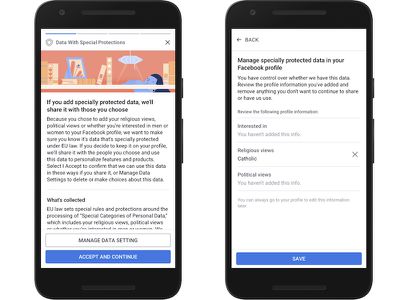Facebook this week shared a blog post explaining "new privacy experiences" that will be available on the social network, in compliance with the European Union's General Data Protection Regulation (GDPR), coming into effect on May 25. Facebook originally detailed part of its plan for GDPR-related privacy features back in January, and is now following through in the wake of the Cambridge Analytica scandal.
The rollout will begin in Europe this week, but the company described the update as being "for everyone on Facebook," and it'll begin expanding worldwide "on a slightly later schedule." In the new blog post, Facebook chief privacy officer Erin Egan explained that users will be asked to make choices about multiple aspects of the social network from now on, including ads, profile data, and face recognition.

As soon as GDPR was finalized, we realized it was an opportunity to invest even more heavily in privacy. We not only want to comply with the law, but also go beyond our obligations to build new and improved privacy experiences for everyone on Facebook. We’ve brought together hundreds of employees across product, engineering, legal, policy, design and research teams. We’ve also sought input from people outside Facebook with different perspectives on privacy, including people who use our services, regulators and government officials, privacy experts, and designers.
Facebook will ask its users to review information about advertising based on partner data, such as websites and apps that use business tools like the Like button. They will be able to decide if they want Facebook to use data from partners to show them these type of ads or not.
For profile information, users that have opted into sharing political, religious, and relationship information will be asked whether to continue sharing this data, and if they want Facebook to use it. The update will make it easier to delete these personal tidbits from profiles as well.
Face recognition has been on Facebook in most parts of the world for about six years, allowing the service to detect when other profiles might be trying to use someone's profile image, among other features. Egan said that specifically in the EU and Canada, face recognition will return but be defaulted to an off state, and users will have the choice to turn it on. For everyone on Facebook, Egan explained that this feature is still "entirely optional" no matter where the user is located.
This week's blog post explained that these requests -- including an updated terms of service and data policy -- will have specific details relevant only to people in the EU, although "the substance" of the policy remains the same globally. As the update launches around the world, the company will "present the information in the ways that make the most sense for other regions."
Otherwise, Facebook users will also start to see new Settings and Privacy shortcuts around the world this week, allowing them to more easily check their data, delete it, or easily download and export it. The social network is also focusing on protecting teenagers with multiple GDPR compliant features that will be launching worldwide. These include limited advertising, disabling face recognition, defaulting audience options for posts to friends only, and more.





















Top Rated Comments
Step 2: Go to facebook's privacy page(s).
Step 3: Delete, delete, delete, my personal info.
— My Opinion —
Everyone else: probably yes.
[doublepost=1524066784][/doublepost]They’re legally mandated to do these things in the EU starting May 25. Not really about backpedaling. More about the 4% of revenue fine they can get slapped with.
At the end of the day, everything is about money.